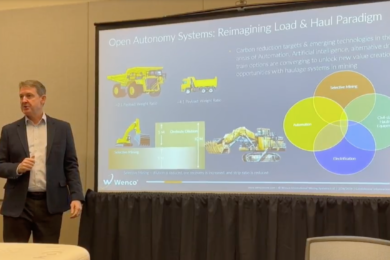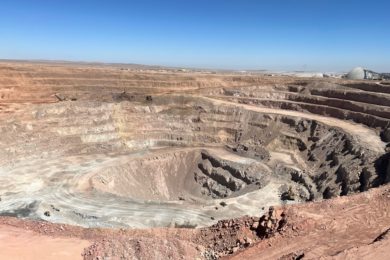Vale recently announced that it has signed three agreements with local authorities and clients to jointly study the feasibility of developing industrial complexes (Mega Hubs) in the Kingdom of Saudi Arabia, the United Arab Emirates and the Sultanate of Oman to produce low carbon footprint products for the steelmaking industry. It includes a Memorandum of Understanding signed with Saudi Arabia’s National Industrial Development Center (NIDC) to develop a plant and logistics centre for the processing and production of high-quality iron pellets in Ras Al-Khair Industrial City.The parties are seeking to cooperate in the development of these Mega Hubs to produce hot briquetted iron (HBI) and steel products to supply both the local and seaborne markets with significant reduction of CO2 emissions. The production of HBI using natural gas emits around 60% less CO2 than the pig iron production through the integrated BF-BoF route. In the future, the replacement of natural gas by hydrogen and the usage of renewable energy could totally eliminate carbon emissions. Vale is expected to build and operate concentration and briquetting plants within the hubs, providing secure supply of high-grade agglomerated products. Local parties are expected to promote the construction of the required logistics infrastructure. Investors and/or clients are expected to construct and operate the direct reduction plants and be off takers of HBI for either the export or domestic markets. These Mega Hubs will supply different markets across the globe supporting the decarbonisation of the steelmaking industry. Vale’s Chief Executive Officer Eduardo Bartolomeo said: “We are very pleased to announce these partnerships, which we believe will be key to support the decarbonisation of the steelmaking industry. With this initiative Vale will guarantee the availability of high-grade agglomerated products and foster the expansion of the low carbon steel industry.” Marcello Spinelli, Vale’s Executive Vice President, Iron Ore, said: “We see a great potential in the direct reduction route, with the demand for these high-grade agglomerated products growing 100 Mt in the next 15-20 years. We shall structurally increase our supply of these highly valuable agglomerated products over the next years, improving the value of our product portfolio. We strongly believe that the Middle East, with its competitive energy prices, strategic location and entrepreneurial mindset, has a unique set of conditions to successfully develop these integrated hubs.” This initiative contributes to Vale’s commitment to reduce 15% of net scope 3 emissions by 2035. Additionally, Vale seeks to reduce its absolute scope 1 and 2 emissions by 33% by 2030 and achieve net zero by 2050, in line with the Paris Agreement, leading the evolution process towards sustainable mining. Vale’s green briquettes were firstly announced last year after being developed for almost 20 years. The product was initially designed to replace direct charge and sinter products in the integrated blast furnace-basic oxygen furnace (BF-BoF) steelmaking route, potentially reducing carbon emissions up to 10%. Green briquettes can also be used in the direct reduction route (as in the Mega Hubs), offering an even ‘greener’ option to the steelmaking sector. To date Vale has signed agreements with more than 30 clients for the development of joint solutions to decarbonise the steel industry. These clients represent around 50% of the company’s scope 3 emissions. In more detail, on October 26, 2022, Vale signed a Memorandum of Understanding (MoU) with the Saudi Arabia’s National Industrial Development Center (NIDC) to jointly study a Mega Hub development in the form of a 4 Mt/y capacity high-quality iron ore pellet production facility. Under the Ministry of Industry and Mineral Resources, the National Industrial Development Center (NIDC) is responsible for establishing the relationships with leading industrial organisations, driving the industrial development of the Kingdom of Saudi Arabia (KSA), being a reference and thought leader for the local industrial sector, supporting economic and technical leadership in the Kingdom.
NIDC stated: “Driven by the Kingdom’s strong economic growth in the construction and industrial sectors, domestic steel demand is growing rapidly, as more production capacity is needed to meet the growth in demand. NIDC, under the guidance of MIM [Ministry of Industry and Mineral Resources], has identified more than 5 Mt of annual steel capacity to be added to the Kingdom’s industrial base, which already has more than 16 Mt of annual capacity.”On October 27, 2022, Vale signed a Memorandum of Understanding (MoU) with the Emirates Steel Arkan (ESA) to jointly study a Mega Hub development at Khalifa Economic Zones Abu Dhabi (KEZAD). ESA is a public joint stock company and the UAE’s largest steel and building materials manufacturer. The Group supply the domestic and international markets with high-quality steel finished products including wire rods, rebars, heavy sections and sheet piles. Additionally, the Group produces premium cement, blocks, pipes, and dry mortar, creating a one-stop shop for the manufacturing and construction sectors. The Group plays a major role in contributing to the diversification of the UAE’s economy in line with the UAE Industrial Strategy ‘Operation 300bn’ and the Abu Dhabi Economic Vision 2030. Through SENAAT, Emirates Steel Arkan is part of ADQ, one of the region’s largest holding companies with a broad portfolio of major enterprises spanning key sectors of Abu Dhabi’s diversified economy. On October 30, 2022, Vale signed a Cooperation Memorandum with the Ministry of Commerce, Industry and Investment Promotion of the Sultanate of Oman to jointly study a Mega Hub development at Special Economic Zone at Duqm.










